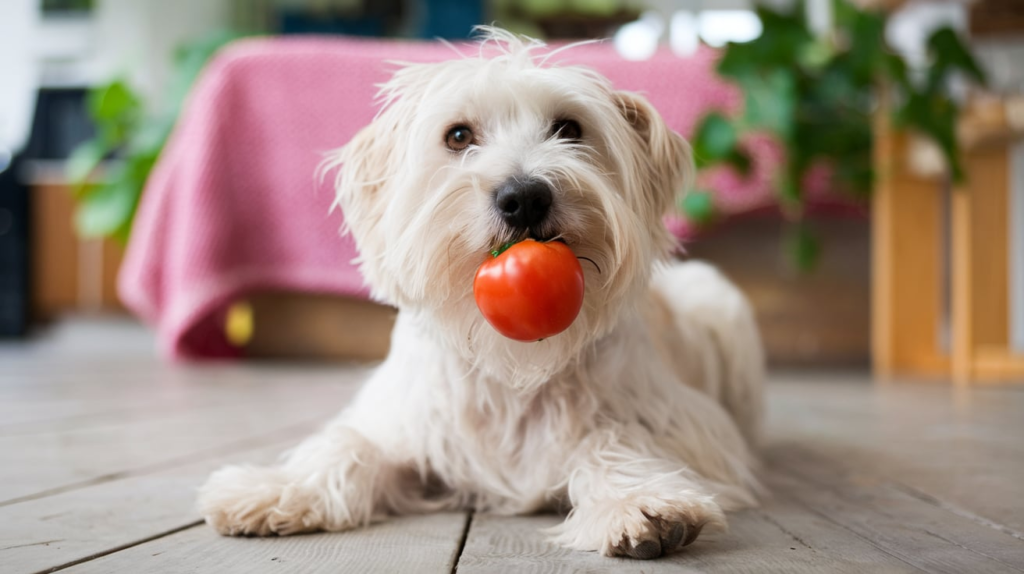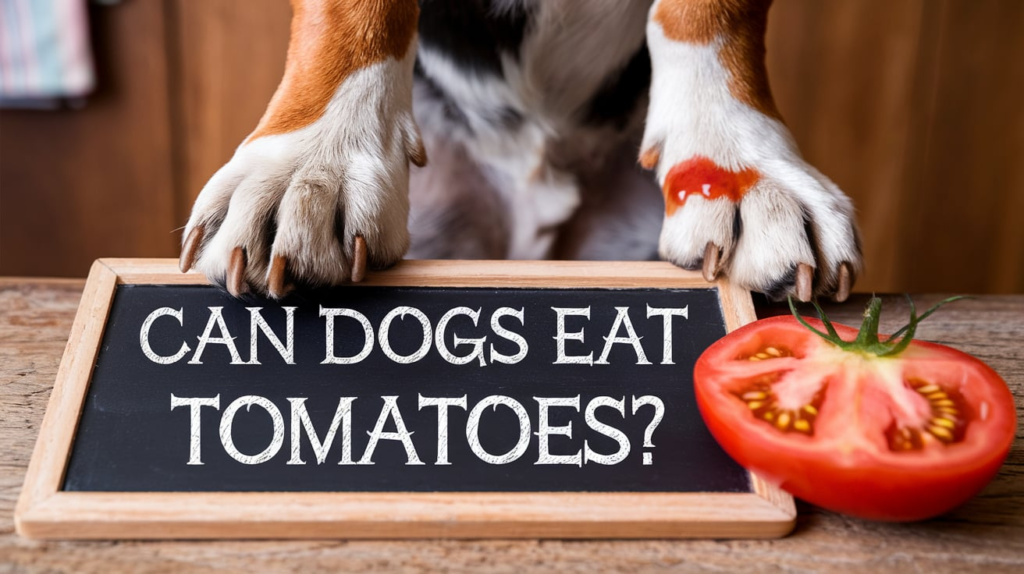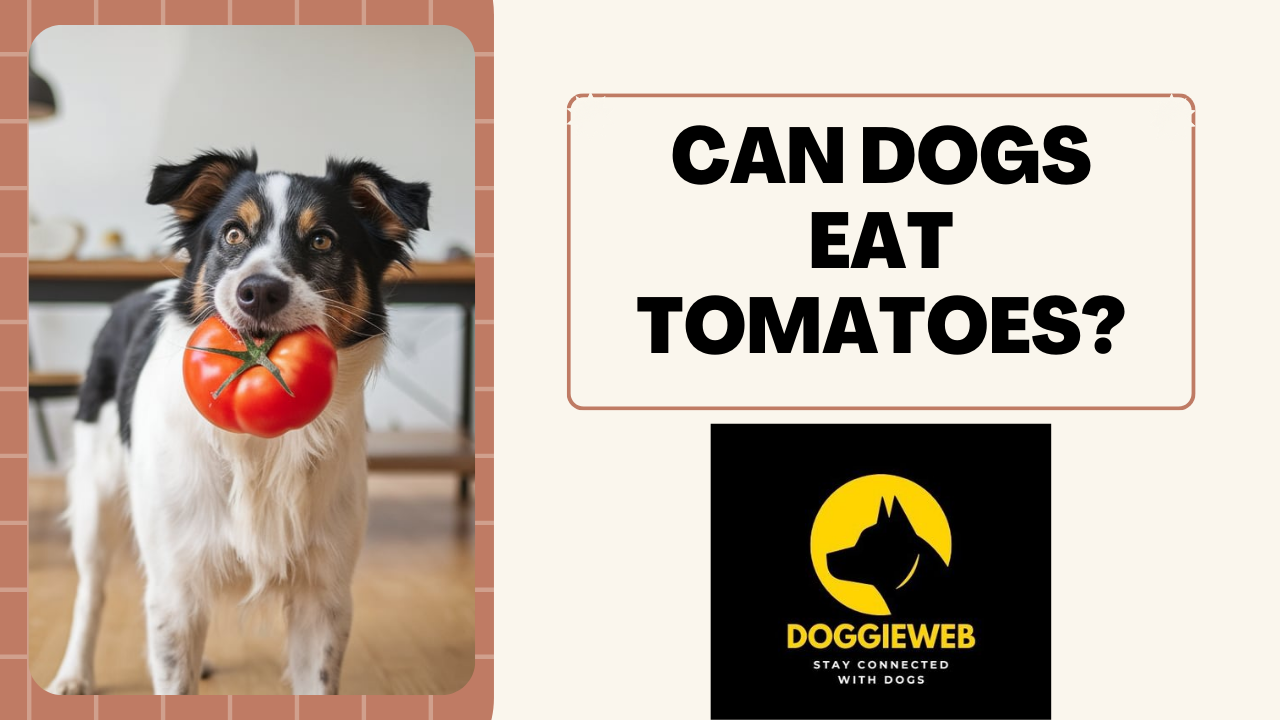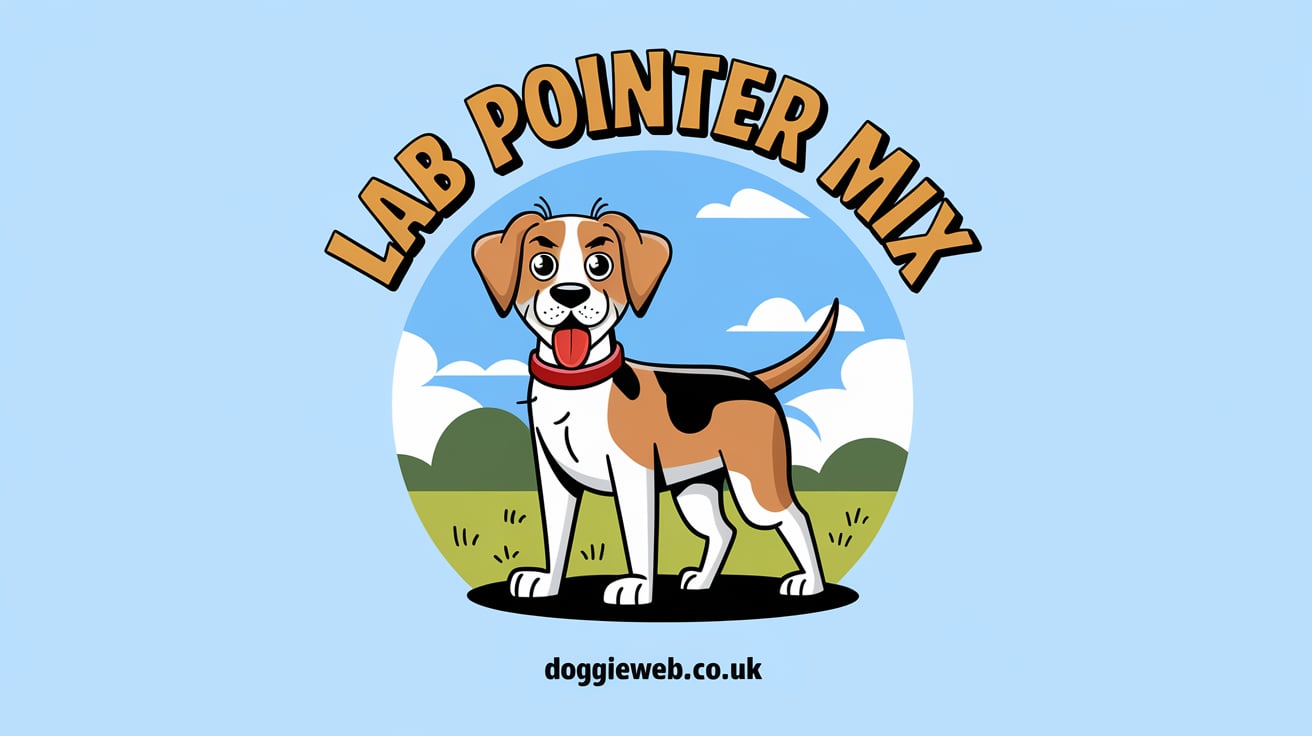Introduction to Can Dogs Eat Tomatoes?
Can Dogs Eat Tomatoes? A regular question among pet owners is whether dogs can eat tomatoes, which has been around their puppies’ weight reduction and health plan. Tomatoes, generally the staple fruit in the human diet, offer several dietary benefits for us, but can the same be said for our canine companions? This article provides an in-depth exploration of the safety and implications of feeding tomatoes to dogs. By analyzing the blessings of abilities, dangers and recommendations for safe consumption, we intend to offer complete expertise in responsible dog care.
Nutritional composition of tomatoes
Can Dogs Eat Tomatoes? Tomatoes contain vital vitamins, including nutrients A, C, and K, as well as fiber and antioxidants such as lycopene. These components contribute to tomatoes’ health benefits in humans, which include boosting immune function and reducing inflammation. However, while beneficial to humans, their implications for puppies still need to be better understood. The dietary charge of tomatoes should be considered in the context of canine health to determine whether or not they will be accurately included in a canine weight reduction plan.
The role of lycopene in tomatoes
Can Dogs Eat Tomatoes? Lycopene is a powerful antioxidant found in tomatoes, which gives them their crimson colour. It is thought to have the ability to reduce oxidative stress and irritation in humans. In principle, lycopene may also want to provide comparable benefits to dogs, supporting their overall fitness and cellular function. However, lycopene’s unique effect on dogs’ health has yet to be significantly studied. Although it can offer several benefits, we must consider the risks associated with tomatoes.
Solanine and its risks
Can Dogs Eat Tomatoes? One of the main problems with feeding tomatoes to dogs is the presence of solanine, a toxic compound found in the inexperienced elements of the tomato plant, including the leaves, stems, and unripe tomatoes. If eaten in large amounts, solanine can cause gastrointestinal distress, lethargy, and exclusive health problems in dogs. Although ripe tomatoes have lower levels of solanine, it is very important to be aware of this danger and ensure that puppies are getting the excellent safety factors of tomatoes.
Effect of tomato acidity
Can Dogs Eat Tomatoes? Tomatoes are acidic, which can cause gastrointestinal distress in some puppies. Acidity can also cause symptoms such as vomiting, diarrhea or abdominal pain, especially if the dog has a sensitive digestive tract. While acidity is less of a challenge with small amounts of ripe tomatoes, exposing your dog to any adverse reactions is very important. Keeping the amount of tomatoes to a minimum can help reduce the risk of gastrointestinal problems.
Guidelines for Safe Tomato Consumption
Can Dogs Eat Tomatoes? If you decide to feed tomatoes to your dog, it is very important to read the positive recommendations to ensure their safety. Only provide ripe tomatoes and do not provide any green parts of the plant, including leaves, stems and unripe fruit. Remove the seeds and stems, as these can pose a health risk to your dog. Introducing tomatoes often and in small amounts will allow you to detect your dog’s reaction and regulate it accordingly.

Cooking tomatoes for safety
Can Dogs Eat Tomatoes? Cooking tomatoes can help reduce the extent of solanine and make them more stable for dogs to consume. By discarding the green factors and cooking the tomatoes, you can reduce the risks associated with solanine. However, even cooked tomatoes must be transported in moderation to avoid gastrointestinal problems. Ensure all cooked tomatoes are free of added spices, salt or other materials that may be dangerous to dogs.
Acknowledgment of unfavorably susceptible responses
Can Dogs Eat Tomatoes? Likewise with any new food added to a canine’s weight reduction plan, it means a lot to look out for signs and side effects of hypersensitive responses. Side effects alongside tingling, expanding, hives or breathing issues may demonstrate sensitivity to tomatoes. If you experience any of these side effects after taking care of your canine tomatoes, quit eating them and look for your vet’s guidance for additional administration. Hypersensitive responses can differ from gentle to serious, so cautiousness is fundamental.
Potential benefits vs. risks
While tomatoes offer certain benefits, including antioxidants and vitamins, they must be weighed against the associated dangers. The presence of solanine and the acidity of tomatoes can present disturbing situations for dogs. Choosing tomatoes in your dog’s diet must be based entirely on carefully evaluating these factors. A consultation with your vet can provide personalized advice and help determine whether tomatoes suit your dog.
Alternatives to tomatoes for treats
Can Dogs Eat Tomatoes? If you’re concerned about the dangers associated with tomatoes, various options can offer similar fitness blessings without the capacity risks. Fruits and vegetables like carrots, blueberries, apples (seedless), and sweet potatoes offer important vitamins and antioxidants in an extra safe form. These options can be a healthy addition to your dog’s diet plan and offer a range without the risks associated with tomatoes.
Portion size monitoring
Can Dogs Eat Tomatoes? Managing the details is essential when introducing any new food into your dog’s diet. Safe foods must be offered fairly to avoid digestive problems and maintain a balanced weight loss program. This means limiting the amount served to small, occasional treats instead of regular meals for tomatoes. Observing your dog’s reaction to new foods and adjusting the size of the details as a final result helps to ensure their normal condition and good being.
Importance of veterinary advice
Before making any adjustments to your dog’s healthy eating plan, it’s always a good idea to discuss it with your veterinarian. A veterinarian can offer expert advice primarily based on your dog’s health and nutritional needs. They can help explore whether tomatoes or exceptional new ingredients are appropriate for your dog’s health and provide safe feeding guidelines.

The role of a balanced diet
Can Dogs Eat Tomatoes? A balanced diet plan is essential to maintaining a dog’s health and well-being. While occasional treats like tomatoes may be part of their diet, they now want to avoid updating the essential vitamins provided by a useful source of exceptional dog food. Ensuring your dog receives a well-balanced healthy weight loss diet tailored to his unique needs will facilitate his regular fitness and minimize the dangers of introducing new foods.
Observing changes in behavior
Can Dogs Eat Tomatoes? When introducing tomatoes or new food to your dog’s diet, watch for behavioral changes that indicate discomfort or conditioning issues. Changes in appetite, strength ranges or toilet behavior can explain how your dog reacts to new foods. Monitoring these changes will allow you to address any issues and adjust your diet quickly.
Preparing tomatoes for dogs
Can Dogs Eat Tomatoes? If you decide to feed your dog tomatoes, proper guidance is high. Wash the tomatoes very well to remove any pesticides or chemicals. Remove all green elements, seeds and stems before presenting the fruit to your dog. Cooking tomatoes can also help make them safer, but ensure they are kept simple and free of added substances. Proper management allows you to reduce the risk of harmful effects and is doing what is right for your dog.
Understanding individual sensitivities
Each dog is specific, and the nature of its sensitivity to delicious delicious foods can vary. While a few puppies can also tolerate small portions of tomatoes without issue, others may react negatively. Understanding your dog’s specific wishes and sensitivities allows you to make an informed choice about his feeding plan. Monitoring how your dog reacts to important food and adjusting his weight loss plan ensures his fitness and luxury.
Educational resources for pet owners
Can Dogs Eat Tomatoes? Educating yourself about pet nutrients and stable feeding practices is vital to responsible puppy ownership. Numerous resources, such as veterinary websites, puppy nutrition books, and expert advice, can provide valuable statistics on what foods are stable and beneficial for dogs. Staying informed will allow you to make better decisions about your dog’s weight loss program and overall health.
Adaptation to dietary changes
Can Dogs Eat Tomatoes? If you incorporate tomatoes or new ingredients into your dog’s diet regimen, be organized for slow changes. Sudden changes to your diet plan can result in digestive problems or other health problems. Gradually introducing new food allows it to adapt to your dog’s digestive system and allows you to avoid adverse reactions. Patience and close monitoring are also key when making nutritional changes to your puppy.
Evaluation of commercial dog foods
Can Dogs Eat Tomatoes? When deciding on industrial dog ingredients, look for products with a balanced dietary profile. Premium dog foods are formulated to meet dogs’ specific dietary needs and reduce the need for additional treats or supplements. Evaluating commercial dog food’s ingredients and dietary content ensures that your pet receives the essential nutrients for the most desirable condition.
Solving common problems
Can Dogs Eat Tomatoes? Common problems with feeding tomatoes to puppies include ability toxicity, gastrointestinal issues, and allergies. Solving these problems involves knowing the risks and blessings associated with tomatoes and taking appropriate precautions. Consulting with your vet and monitoring your dog’s condition can help you address any concerns and ensure a stable and healthy weight loss program.

The importance of moderation
Moderation is paramount when feeding tomatoes or any new dog food. While small servings of ripe tomatoes can be a safe and exciting treat, excessive consumption can cause health problems. Balancing treats with a great weight loss plan and offering plenty of consistent meals makes it easy to keep your dog healthy and saves you the trouble of overfeeding.
Final thoughts
Can Dogs Eat Tomatoes? In conclusion, when given with care and caution, tomatoes can be stable and exciting for dogs. Understanding the dietary benefits, potential risks, and guidelines for safe consumption is important to responsible pet ownership. By following these tips and consulting your vet, you can choose to include tomatoes or other new foods in your dog’s diet to ensure he’s fit and well.
FAQ: Can dogs eat tomatoes?
1. Can dogs thoroughly eat tomatoes?
Yes, puppies can eat tomatoes properly with care, but important precautions must be taken. Ripe tomatoes are much less unstable than unseasoned tomatoes or unseasoned elements of the plant, which include solanine, a poisonous compound. Always remove stems, leaves, and unripe tomatoes before presenting them to your dog.
2. What are the blessings of tomato abilities for puppies?
Tomatoes contain nutrients A, C, and K and antioxidants such as lycopene, which may provide some fitness benefits. These nutrients can also help your dog’s immune system and daily fitness. However, these blessings must be weighed against the risks of the abilities.
3. What are the dangers of feeding tomatoes to puppies?
The number one danger is solanine, found in inexperienced elements of the tomato plant and unripe tomatoes. This compound can cause gastrointestinal disillusionment, lethargy, and various health problems in dogs. In addition, the acidity of tomatoes can cause stomach pain.
4. How do I prepare tomatoes for my dog?
To prepare the tomatoes for your dog, wash them well, removing all green parts, stems, and seeds. To reduce the range of solanine, it is extra stable for tomato dinner preparation. Avoid any spices or ingredients that could be dangerous to dogs.
5. Can cooking tomatoes make them more stable for puppies?
Cooking tomatoes can help reduce solanine levels and make dogs more stable even c. However, tomatoes must be handled carefully and not contain salts or various flavorings.










